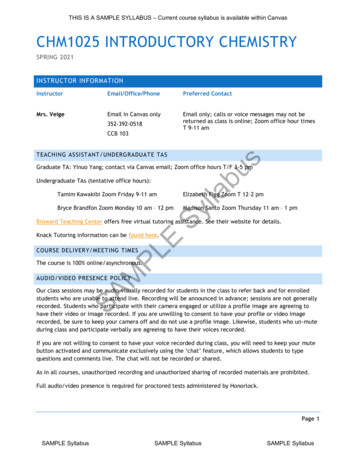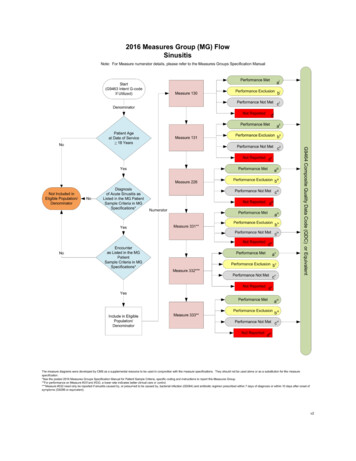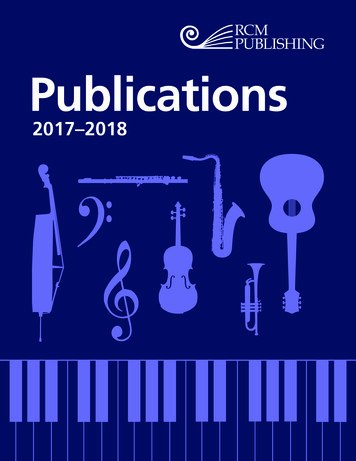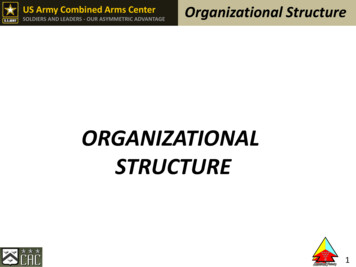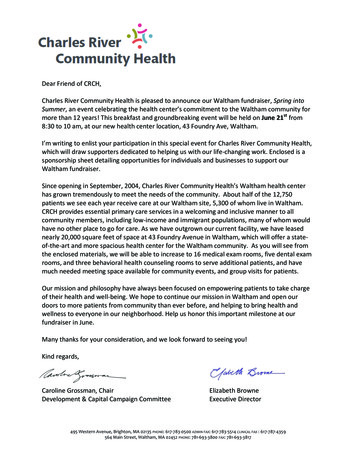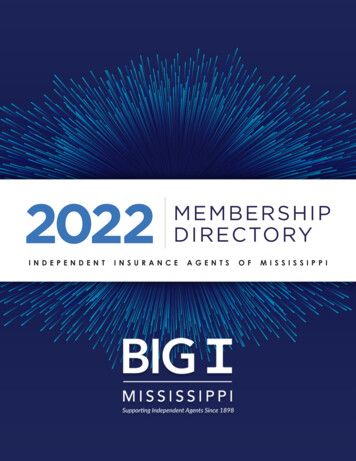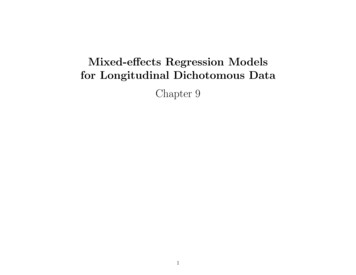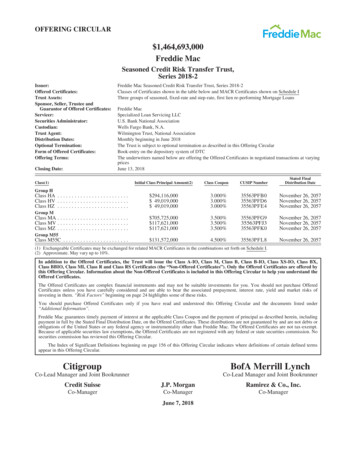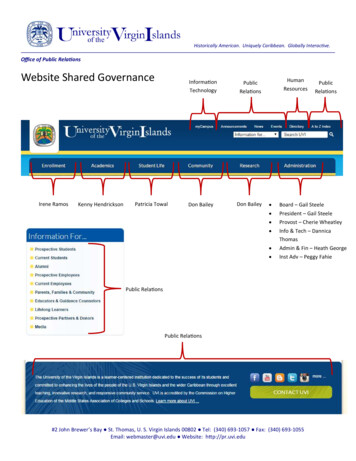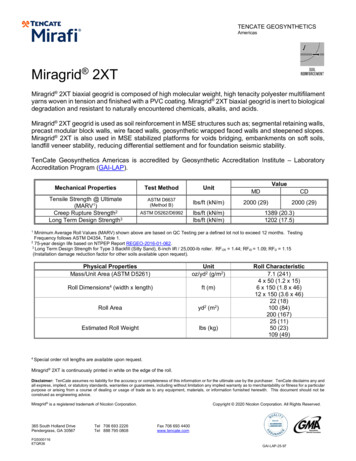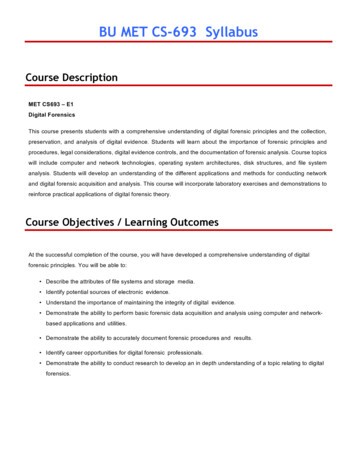
Transcription
BU MET CS-693 SyllabusCourse DescriptionMET CS693 – E1Digital ForensicsThis course presents students with a comprehensive understanding of digital forensic principles and the collection,preservation, and analysis of digital evidence. Students will learn about the importance of forensic principles andprocedures, legal considerations, digital evidence controls, and the documentation of forensic analysis. Course topicswill include computer and network technologies, operating system architectures, disk structures, and file systemanalysis. Students will develop an understanding of the different applications and methods for conducting networkand digital forensic acquisition and analysis. This course will incorporate laboratory exercises and demonstrations toreinforce practical applications of digital forensic theory.Course Objectives / Learning OutcomesAt the successful completion of the course, you will have developed a comprehensive understanding of digitalforensic principles. You will be able to: Describe the attributes of file systems and storage media. Identify potential sources of electronic evidence. Understand the importance of maintaining the integrity of digital evidence. Demonstrate the ability to perform basic forensic data acquisition and analysis using computer and networkbased applications and utilities. Demonstrate the ability to accurately document forensic procedures and results. Identify career opportunities for digital forensic professionals. Demonstrate the ability to conduct research to develop an in depth understanding of a topic relating to digitalforensics.
Course Outline Calendar Tool - You can see many due dates in the calendar tool. You may add your own events there aswell. However, please be aware that you may not find all of the important dates for the course listed there.You will stay current by checking announcements, discussions, and emails throughout the course. Readings - Each module has both textbook readings and online readings. Your professor may suggestadditional readings during the course. Discussions - There are both class and group threaded discussions for each module. These discussions aremoderated by your facilitator. Postings for each discussion should be completed by the assigned due dates.There are also general discussions boards, which are not graded, for you to use to discuss any issues withyour classmates. Please see the Class Discussion and Users and Groups menus on the home page for moredetails. Assignments and labs - There are assignments and labs that are due throughout the course. Please accessfrom the Assignments menu. Midterm and Final Exams - Assessments are also listed in the course calendar and accessed from theAssessments menu.Module 1: Digital Forensics and Incident ResponseOverview of Digital Forensics and Incident Response and Incident Response and Investigations: Legal Aspects ofDigital Forensics.Module 2: Computing and Network DevicesIntroduction to Computing and Network Devices and Operating System Architecture and Disk Structures.Module 3: Digital Forensic Acquisition and AuthenticationPrinciples of Digital Forensic Acquisition and Authentication and Digital Evidence Handling and Processing DigitalForensic Media Acquisition, Midterm ExaminationModule 4: Digital Forensic AnalysisPrinciples of Digital Forensic Analysis and Applications and Digital Forensic Media Analysis (UNIX/Linux).Module 5: Network Forensic AnalysisPrinciples of Network Forensic Analysis (Laboratory Session) and Digital Forensic Media Analysis (MicrosoftWindows)Module 5: Forensic Reports and TestimonyForensic Reports and Testimony Special Topics in Digital Forensics
Course Materials and ResourcesRequired Book BundleImportant note from the Instructor:The correct book bundle (including Lab Manual access) can be purchasedBarnes and Knoble at Boston University, athrough this bundle is also availablefrom Cengage, and on Amazon, just assure that you get the full version with labaccess. Hardcopy text and MindTap online for labs bundle: Nelson, B., Phillips, A., &Steuart, C, (2019). Guide to Computer Forensics and Investigations, Loose-leafVersion, 6th MindTap Computing, 1 term (6 months) Printed Access Card.ISBN#: 9781337757096.Or Students can also purchase just the access card for MindTap online with theeBook:MindTap for Nelson/Phillips/Steuart's Guide to Computer Forensics andInvestigations, 1 term Printed Access CardISBN#:9781337568999Please note: 5th edition content will NOT be an acceptable resource. You MUST purchase the Lab Manual. The lab assignments depend on thecontent provided. Cengage also has setup a student site to urchase the reguired resourcesirectlY. from them. However, please note Cengage Unlimited is NOT required.If you have any questions you can contact the instructor and the course facilitator.Register and Access Cengage LinkPlease .,&gister to access Cenmme online (via the access code you will receive for MindTap access).Cengage provided an verview of the Rrocurement and registration w ocess.Course Downloads and ReferencesForensic Examination of Digital Evidence: A Guide for Law EnforcementNCJ 199408, April 2004, Special Report, National Institute of Justice
Electronic Crime Scene Investigation: A Guide for First RespondersNCJ 187736, July 2001, NIJ Guide, National Institute of JusticeDigital Evidence in the Courtroom: A Guide for Law Enforcement & ProsecutorsInvestigations Involving the Internet and Computer NetworksNCJ 210798, January 2007, Special Report, National Institute of JusticeCloud Computing Forensic Science ChallengesGRIZZLY STEPPE - Russian Malicious Cyber Activity: Joint Analysis ReportGRIZZLY STEPPE - Russian Malicious Cyber Activity: IndicatorsAdditional References Incident ResponsePurdue University Incident Response Policy (VII.B.3) Conditions on Use and Policy on Computing EthicsBoston University Designing and Developing an Application for Incident Response TeamsFIST 2006 Conference United States Code Investigations Involving the Internet and Computer NetworksNCJ 210798, January 2007, Special Report, National Institute of JusticeInstructorScot ArenaSenior LecturerComputer Science DepartmentMetropolitan CollegeBoston University1010 Commonwealth Ave, 3rd floor – Rm. 318Boston, MA 02215sdarena@bu.eduThe best way to reach me outside of our class sessions is to email me at my BU email address. I normally pick upmy course and regular email many times per day.
Boston University Library InformationBoston University has created a set of videos to help orient you to the online resources at your disposal. A link will beavailable within the course for these videos.All of the videos in the series are available on the Online Library Resources page, which is also accessible from theCampus Bookmarks section of your Online Campus Dashboard. Please feel free to make use of them.As Boston University students, you have full access to the BU Library. From any computer, you can gain access toanything at the library that is electronically formatted. To connect to the library, use the link http://www.bu.edu/library.You may use the library's content whether you are connected through your online course or not, by confirming yourstatus as a BU community member using your Kerberos password.Once in the library system, you can use the links under "Resources" and "Collections" to find databases, eJournals,and eBooks, as well as search the library by subject. Some other useful links follow:Go to Collections to access eBooks and eJournals directly.If you have questions about library resources, go to Ask a Librarian to email the library or use the livechat feature.To locate course eReserves, go to Reserves.Please note that you are not to post attachments of the required or other readings in the water cooler or other areasof the course, as it is an infringement on copyright laws and department policy. All students have access to thelibrary system and will need to develop research skills that include how to find articles through library systems anddatabases.Microsoft Imagine for Academic InstitutionsMetropolitan College is a member of Microsoft Imagine for Academic Institutions (formerly DreamSpark), a Microsoftprogram that supports technical education by providing access to Microsoft software for learning, teaching, andresearch purposes. Our membership allows faculty and students currently enrolled in MET courses to obtain certainMicrosoft products free of charge. All MET students are granted access to download the software for the duration oftheir study at MET College.FAQ and basic information are at Microsoft Imagine Software Center.VMware Academic ProgramMetropolitan College is a member of The VMware Academic Program. VMAP enables current MET students andfaculty to gain easy access to cutting-edge virtualization technology and resources.All current MET students are granted access to download.For information on how to login and get support, please visit VMware Academic Program.
Study GuideThe following material is collected here for your convenience but the required readings, discussion details, andassignment particulars can be found within the modules, in the "Discussion" section of the course, and in the"Assignment" sections respectively.In preparation for this course you should read:Forensic Examination of Digital Evidence: A Guide for Law EnforcementNCJ 199408, April 2004, Special Report, National Institute of JusticeDigital Evidence in the Courtroom: A Guide for Law Enforcement & ProsecutorsModule 1 Study Guide and DeliverablesReadings:Discussions:Online lecture material and Guide to Computer Forensics and Investigations, Chapters 1;Optional: File System Forensic Analysis, Chapter 2Post your introductions.Discussion 1 and Discussion 2.Assignments: Homework Assignment 1 Refer to Calendar for Due DatesLabs:Please attempt labs 1.1 - 1.4 that are listed in the module 2 labs. These labs install software youwill need going forward. Take screenshots so you can use them for your Module 2 labsubmission.Assessments: Quiz 1 Refer to Calendar for Due DatesModule 2 Study Guide and DeliverablesReadings:Discussions:Online lecture material and Guide to Computer Forensics and Investigations, Chapters 2 and 5;Optional: File System Forensic Analysis, Chapter 2Discussion 3Discussion 4Assignments: Homework Assignment 2 Refer to Calendar for Due DatesLabs:Lab 2
Module 3 Study Guide and DeliverablesReadings:Discussions:Online lecture material and Guide to Computer Forensics and Investigations, Chapters 3 and 13;Optional: File System Forensic Analysis, Chapter 3Discussion 5Discussion 6.Assignments: Homework Assignment 3 Refer to Calendar for Due DatesLabs:Lab 3Assessments: Mid-Term Exam.Module 4 Study Guide and DeliverablesReadings:Discussions:Online lecture material and Guide to Computer Forensics and Investigations, Chapters 4, 6, 8;No more Discussions past 6.Assignments: Homework Assignment 4 Refer to Calendar for Due DatesLabs:Lab 4Module 5 Study Guide and DeliverablesReadings:Discussions:Online lecture material and Guide to Computer Forensics and Investigations, Chapters 9, 10, 11;No more Discussions past 6.Assignments: Homework Assignment 5 Refer to Calendar for Due DatesLabs:Lab 5Module 6 Study Guide and DeliverablesReadings:Discussions:Online lecture material and Guide to Computer Forensics and Investigations, Chapters 12, 14;No more Discussions past 6.Assignments: No further Homework Assignments Refer to Calendar for Due DatesLabs:Lab 6
Final Exam DetailsThe Computer Science department requires that all final exams in the program be proctored. Consequently, theFinal Exam in this course will be held on the last evening of class : Date TBD.The final exam is a two hour, closed-book comprehensive exam covering the material from the entire course. Theexam will only be accessible during the final exam period. Students can access it from the Assessments section ofthe course. Each student will need to enter a password to access it,During the final exam, students are required to work independently without using any additional notes or material.The Final is an Open-Book exam however accessing online material, lecture notes, emails, discussion boards, chatfeatures or any other online material during the exam is not permitted, and some features of the online coursemay be disabled.Please note that student activity during the final exam may be monitored and recorded in log files. Accessing anyonline or other material during the final exam is a major violation of the course policy and can result in seriousacademic disciplinary actions.Course Grading StructureEach module in this course will cover one or more core digital forensic principles, along with details on the collection,preservation, and analysis of digital evidence. Most modules will also have at least one lab component. Students willbe able to demonstrate their understanding of the fundamental of digital forensics through these assignments.Grading PolicyAll students will be expected to demonstrate digital forensics knowledge and techniques. To obtain an exceptionalgrade you have to exceed expectations in your projects, quizzes and assignments.Grading Structure and DistributionThe grade for the course is determined by the following:Grading SchemeHomework idterm Examination10%
Final Examination30%SE Paper10%D.B. Paper10%Grade Scale for class below :Letter GradeAAB BBC CCDFHonor Points4.03.73.33.02.72.32.01.71.00.0Decimal Range95 91 - 9488 - 9084 - 8781 - 8378 - 8074 - 7771 - 7368 - 70Below 67The decimal range shows whole numbers, actual is always From X.00 to Y.99 ( i.e. 91.00 - 94.99)Course RequirementsParticipation / Discussions Graded Discussions - all discussions will be graded on a 100-point scale.Assignments and LabsAssignments will be assigned during the semester to reinforce topics presented during classroom lectures. Allhomework must be the original effort of the student submitting the assignment.ExpectationsMany learning activities require sharing your assignments and opinions with your classmates. For example, you maybe given a set of criteria on the basis of which to evaluate other classmates' assignments, and asked to submit theresults to your facilitator by a specified date. It is, therefore, very important that you, as well as your classmates,submit your assignments on a timely basis. Timely submission by all will result in each of you being able to evaluateeach other's assignments. Due dates will be indicated for each assignment in the Assignments section of thecourse.
DelaysIf, for any reason, you are unable to meet any assignment deadline, contact your instructor. All assignments must becompleted and must be turned in by their due dates and due times. Extensions may be granted, though only undermitigating circumstances.Academic Conduct PolicyPlease visit Metropolitan College's website for the full text of the department's Academic Conduct Code.A Definition of Plagiarism"The academic counterpart of the bank embezzler and of the manufacturer who mislabels products isthe plagiarist: the student or scholar who leads readers to believe that what they are reading is theoriginal work of the writer when it is not. If it could be assumed that the distinction between plagiarismand honest use of sources is perfectly clear in everyone's mind, there would be no need for theexplanation that follows; merely the warning with which this definition concludes would be enough. Butit is apparent that sometimes people of goodwill draw the suspicion of guilt upon themselves (and,indeed, are guilty) simply because they are not aware of the illegitimacy of certain kinds of "borrowing"and of the procedures for correct identification of materials other than those gained throughindependent research and reflection.""The spectrum is a wide one. At one end there is a word-for-word copying of another's writing withoutenclosing the copied passage in quotation marks and identifying it in a footnote, both of which arenecessary. (This includes, of course, the copying of all or any part of another student's paper.) It hardlyseems possible that anyone of college age or more could do that without clear intent to deceive. At theother end there is the almost casual slipping in of a particularly apt term which one has come across inreading and which so aptly expresses one's opinion that one is tempted to make it personal property.""Between these poles there are degrees and degrees, but they may be roughly placed in two groups.Close to outright and blatant deceit-but more the result, perhaps, of laziness than of bad intent-is thepatching together of random jottings made in the course of reading, generally without carefulidentification of their source, and then woven into the text, so that the result is a mosaic of otherpeople's ideas and words, the writer's sole contribution being the cement to hold the pieces together.Indicative of more effort and, for that reason, somewhat closer to honest, though still dishonest, is theparaphrase, and abbreviated (and often skillfully prepared) restatement of someone else's analysis orconclusion, without acknowledgment that another person's text has been the basis for therecapitulation."The paragraphs above are from H. Martin and R. Ohmann, The Logic and Rhetoric of Exposition, Revised Edition.Copyright 1963, Holt, Rinehart and Winston.
Academic Conduct CodeI. Philosophy of DisciplineThe objective of Boston University in enforcing academic rules is to promote a community atmosphere inwhich learning can best take place. Such an atmosphere can be maintained only so long as every studentbelieves that his or her academic competence is being judged fairly and that he or she will not be put at adisadvantage because of someone else's dishonesty. Penalties should be carefully determined so as to be nomore and no less than required to maintain the desired atmosphere. In defining violations of this code, theintent is to protect the integrity of the educational process.II. Academic MisconductAcademic misconduct is conduct by which a student misrepresents his or her academic accomplishments, orimpedes other students' opportunities of being judged fairly for their academic work. Knowingly allowingothers to represent your work as their own is as serious an offense as submitting another's work as your own.Ill. Violations of this CodeViolations of this code comprise attempts to be dishonest or deceptive in the performance of academic workin or out of the classroom, alterations of academic records, alterations of official data on paper or electronicresumes, or unauthorized collaboration with another student or students. Violations include, but are notlimited to:A. Cheating on examination. Any attempt by a student to alter his or her performance on anexamination in violation of that examination's stated or commonly understood ground rules.B. Plagiarism. Representing the work of another as one's own. Plagiarism includes but is not limited tothe following: copying the answers of another student on an examination, copying or restating the workor ideas of another person or persons in any oral or written work (printed or electronic) without citingthe appropriate source, and collaborating with someone else in an academic endeavor withoutacknowledging his or her contribution. Plagiarism can consist of acts of commission-appropriating the wordsor ideas of another-or omission failing to acknowledge/document/credit the source or creator of words orideas (see below for a detailed definition of plagiarism). It also includes colluding with someone else in anacademic endeavor without acknowledging his or her contribution, using audio or video footage that comesfrom another source (including work done by another student) without permission and acknowledgement ofthat source.C. Misrepresentation or falsification of data presented for surveys, experiments, reports, etc., whichincludes but is not limited to: citing authors that do not exist; citing interviews that never took place, orfield work that was not completed.D. Theft of an examination. Stealing or otherwise discovering and/or making known to others thecontents of an examination that has not yet been administered.E. Unauthorized communication during examinations. Any unauthorized communication may beconsidered prima facie evidence of cheating.F. Knowingly allowing another student to represent your work as his or her own. This includesproviding a copy of your paper or laboratory report to another student without the explicit permission of
the instructor(s).G. Forgery, alteration, or knowing misuse of graded examinations, quizzes, grade lists, or officialrecords of documents, including but not limited to transcripts from any institution, letters ofrecommendation, degree certificates, examinations, quizzes, or other work after submission.H. Theft or destruction of examinations or papers after submission.I. Submitting the same work in more than one course without the consent of instructors.J. Altering or destroying another student's work or records, altering records of any kind, removingmaterials from libraries or offices without consent, or in any way interfering with the work of others soas to impede their academic performance.K. Violation of the rules governing teamwork. Unless the instructor of a course otherwise specificallyprovides instructions to the contrary, the following rules apply to teamwork: 1. No team member shallintentionally restrict or inhibit another team member's access to team meetings, team work-inprogress, or other team activities without the express authorization of the instructor. 2. All teammembers shall be held responsible for the content of all teamwork submitted for evaluation as if eachteam member had individually submitted the entire work product of their team as their own work.L. Failure to sit in a specifically assigned seat during examinations.M. Conduct in a professional field assignment that violates the policies and regulations of the hostschool or agency.N. Conduct in violation of public law occurring outside the University that directly affects theacademic and professional status of the student, after civil authorities have imposed sanctions.0 . Attempting improperly to influence the award of any credit, grade, or honor.P. Intentionally making false statements to the Academic Conduct Committee or intentionallypresenting false information to the Committee.Q. Failure to comply with the sanctions imposed under the authority of this code.
Important message on Final ExamsDear Boston University Computer Science Online Student,As part of our ongoing efforts to maintain the high academic standard of all Boston University programs, includingour online MSCIS degree program, the Computer Science Department at Boston University's Metropolitan Collegerequires that each of the online courses includes a proctored final examination.By requiring proctored finals, we are ensuring the excellence and fairness of our program. The final exam isadministered online, and the access will be available at the exam sites.Specific information regarding final-exam scheduling will be provided approximately two weeks into the course. Thisearly notification is being given so that you will have enough time to plan for where you will take the final exam.I know that you recognize the value of your Boston University degree and that you will support the efforts of theUniversity to maintain the highest standards in our online degree program.Thank you very much for your support with this important issue.Regards,Professor Lou Chitkushev, Ph.D.Associate Dean for Academic AffairsBoston University Metropolitan CollegeDisability ServicesIn accordance with University policy, every effort will be made to accommodate unique and special needs ofstudents with respect to speech, hearing, vision, or other disabilities. Any student who feels he or she may need anaccommodation for a documented disability should contact Disability & Access Services at (617) 353-3658 or ataccess@bu.edu for review and approval of accommodation requests.NetiquetteThe Office of Distance Education has produced anetiquette guide to help you understand the potentialimpact of your communication style.Before posting to any discussion forum, sending email, orparticipating in any course or public area, please considerthe following:Ask Yourself . How would I say this in a face-to-face classroom or if writing for a newspaper, public blog, or wiki?
How would I feel if I were the reader? How might my comment impact others? Am I being respectful? Is this the appropriate area or forum to post what I have to say?WritingWhen you are writing, please follow these rules: Stay polite and positive in your communications. You can and should disagree and participate indiscussions with vigor; however, when able, be constructive with your comments. Proofread your comments before you post them. Remember that your comments are permanent. Pay attention to your tone. Without the benefit of facial expressions and body language your intended toneor the meaning of the message can be misconstrued. Be thoughtful and remember that classmates' experience levels may vary. You may want to includebackground information that is not obvious to all readers. Stay on message. When adding to existing messages, try to maintain the theme of the comments previouslyposted. If you want to change the topic, simply start another thread rather than disrupt the currentconversation. When appropriate, cite sources. When referencing the work or opinions of others, make sure to use correctcitations.ReadingWhen you are reading your peers' communication, consider the following: Respect people's privacy. Don't assume that information shared with you is public; your peers may not wantpersonal information shared. Please check with them before sharing their information. Be forgiving of other students' and instructors' mistakes. There are many reasons for typos andmisinterpretations. Be gracious and forgive other's mistakes or privately point them out politely. If a comment upsets or offends you, reread it and/or take some time before responding.Important NoteDon't hesitate to let your instructor or your faculty and student support administrator know if you feelothers are inappropriately commenting in any forum.All Boston University students are required to follow academic and behavioral conduct codes. Failure to comply withthese conduct codes may result in disciplinary action.
Technical SupportBoston University technical support is available via email (ithelR.@bu.edu), the support form, and phone (888-2434596). Please note that the IT Help Center has multiple locations. All locations can be reached through the previouslymentioned methods. For IT Help Center hours of operation please visit their contact page. For other times, you maystill submit a support request via email, phone, or the support form, but your question won't receive a response untilthe following day. If you aren't calling, it is highly recommended that you submit your support request via the technicalsupport form as this provides the IS&T Help Center with the best information in order to resolve your issue as quicklyas possible.Examples of issues you might want to request support for include the following: Problems viewing or listening to sound or video files Problems accessing internal messages Problems viewing or posting comments Problems attaching or uploading files for assignments or discussions Problems accessing or submitting an assessmentTo ensure the fastest possible response, please fill out the online form using the link below:IT Help Center Support888-243-4596 or 617-353-4357 or WebCheck your open tickets using BU's ticketing system.Navigating CoursesFor best results when navigating courses, it is recommended that you use the Mozilla Firefox browser.The Table of Contents may contain folders. These folders open and close( and - signs) and may conceal somepages. To avoid missing content pages, you are advised to use the next- and previous-page buttons (and icons) inthe top-right corner of the learning content.Please also familiarize yourself with the navigation tools, as shown below; these allow you to show and hide boththe Course Menu and the Table of Contents on the left. This will be helpful for freeing up screen space when movingthrough the weekly lecture materials.Navigation tools for the Table of Contents are shown in the image below:
Clicking on the space between the Course Menu and the Table of Contents allows you to show or hide the CourseMenu on the left:Web Resources/Browser Plug-InsTo view certain media elements in this course, you will need to have several browser plug-in applications installedon your computer. See the Course Resources page in the syllabus of each individual course for other specificsoftware requirements . Check your computer's compatibility by reviewing Blackboard's System Requirements Check your browser settings with Blackboard's Connection Test Download most recent version of Adobe Flash Player Download most recent version of Adobe Acrobat ReaderHow to Clear Your Browser CacheThe IT Help Center recommends that you periodically clear your browser cache to ensure that you are viewing themost current content, particularly after course or system updates.This page is also found within the "How to. " section of the online documentation, which contains a list of some ofthe most common tasks in Blackboard Learn.
Cloud Computing Forensic Science Challenges GRIZZLY STEPPE - Russian Malicious Cyber Activity: Joint Analysis Report GRIZZLY STEPPE - Russian Malicious Cyber Activity: Indicators Additional References Incident Response Purdue University Incident Response Policy (VII.B.3) Conditions on Use and Policy on Computing Ethics Boston University

